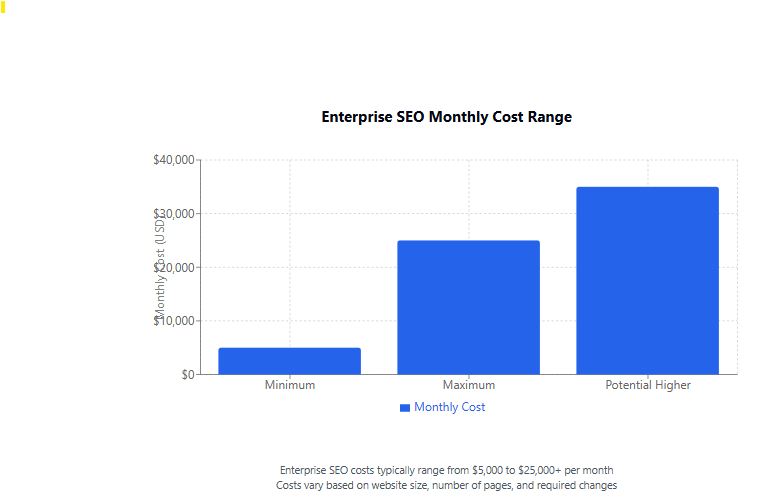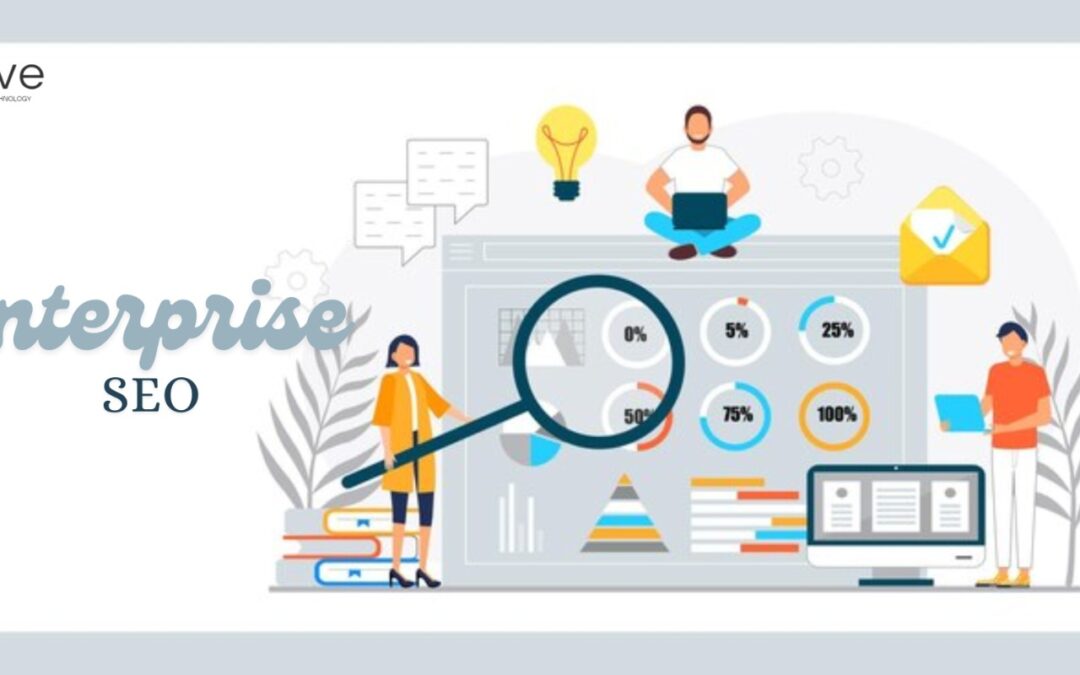Discover how to master enterprise SEO with strategies tailored for large websites. Learn key tactics, tools, and techniques to boost rankings and traffic at scale.
Introduction
If you’re running a large business or managing a website for a big brand, you’ve probably heard about Enterprise SEO. But what exactly is it? And how is it different from regular SEO?
This guide will simplify everything about Enterprise Search Engine Optimization — from what it means to how it works and why it’s important for large-scale businesses. Whether you’re part of a big team, an enterprise SEO company, or just exploring enterprise-level SEO, this article covers it all.
What is Enterprise SEO?
Enterprise SEO is a special type of search engine optimization (SEO) used by big companies or websites with many pages. It’s like having a giant library with thousands of books. If you want people to find the right book, you need a system to organize everything perfectly. That’s what Enterprise SEO does—it helps big companies manage their websites so people can easily find what they’re looking for.
Why Do Big Companies Need Enterprise SEO?
Big companies have huge websites with many pages. Imagine a store with hundreds of products—how would customers find the item they want? Without the right help, people would never be able to find the best products. Enterprise SEO ensures that these big websites are easy to use, find on Google, and run smoothly.
For example, imagine running a huge online store with thousands of items. You would need special systems and helpers to ensure everything works well. Without Enterprise SEO, the website might be too slow, messy, or hard to find in search engines.
How Does Enterprise SEO Work?
When companies do Enterprise SEO, they work on improving many things. Some of these include:
1. Organizing the Website
Big websites can have thousands of pages, like an online store with clothes, shoes, bags, electronics, and more. People will get confused and leave if the website isn’t well organized. Enterprise SEO helps organize all these pages by:
- Creating a clear structure, like categories and subcategories (just like shelves in a store).
- Ensure each page is linked properly so visitors and search engines can move easily from one page to another.
- Using breadcrumbs and menus to help people know where they are on the website.
This makes the website easier for both people and search engines to understand.
2. Fixing Website Problems
A big website can often have broken links, missing images, or pages that take a long time to load. These issues hurt the user experience and search rankings. Enterprise SEO helps by:
- Finding broken pages or links and fixing them quickly.
- Make sure the website loads fast on both computers and mobile phones.
- Checking for errors in the website code and cleaning them up.
- Keeping the website secure by using HTTPS and fixing bugs.
Fixing these problems helps users stay longer and makes the website trustworthy in the eyes of Google.
3. Improving the Content
Good content is like a conversation—it should be clear, interesting, and helpful. Enterprise SEO works on:
- Updating old content so fresh matches what people are searching for today.
- Adding keywords naturally so Google understands what each page is about.
- Use headings, bullet points, and images to make the content easy to read.
- Writing content that answers questions and gives value to the reader.
- Make sure the content is unique and not copied from other websites.
This helps visitors find the right information quickly and keeps them engaged.
4. Using Special Tools
Enterprise SEO uses advanced tools to manage and monitor large websites. These tools help in:
- Search keywords to see what people are searching for and how the website ranks.
- Analyzing website traffic—how many people visit, from where, and what they do on the site.
- Finding technical SEO issues like duplicate content, missing meta tags, or sitemap errors.
- Measuring page performance, such as which pages people like the most and which they leave quickly.
- Helping teams make data-driven decisions to keep improving the website.
What Makes Enterprise SEO Different from Regular SEO?
Enterprise SEO differs from regular SEO because it’s designed for larger, more complex websites. Imagine you’re cleaning a small room—it’s easier than cleaning a whole building with many rooms. The same goes for SEO—smaller websites can be fixed quickly, but big websites need more time, special tools, and more people to help make everything work.
Enterprise SEO also focuses on scaling, ensuring the website works well as it grows.
What Are Some of the Challenges with Enterprise SEO?
When working with big websites (also called enterprise websites), some common problems can make enterprise SEO difficult. Let’s look at them one by one:
1. Lots of Content
Big companies usually have thousands of pages on their website. For example, an online store might have separate pages for each product, each category, each brand, and more. That’s a lot of content to manage! The challenges include:
- Make sure every page has the right keywords (like “best running shoes” or “laptop deals”).
- Avoiding duplicate content, which can confuse search engines and lower rankings.
- Keeping old pages updated with fresh, helpful content.
- Organizing pages so they are easy for both users and search engines to find.
This is why many companies hire an enterprise SEO consultant or use enterprise SEO services to keep things running smoothly.
2. Slow Websites
Enterprise websites can become slow because they have so much going on—images, videos, product pages, and tools. But speed matters because:
- People might leave the site if a page takes more than a few seconds to load.
- Search engines like Google also rank fast websites higher.
- Slow pages can affect mobile users the most, especially those with weak internet.
Enterprise SEO optimization services focus on improving website speed by compressing images, using clean code, and using faster servers. This is a big part of technical SEO for enterprise companies.
3. Technical Problems
Big websites often face technical SEO challenges that smaller websites don’t. Some common technical issues include:
- Broken links lead to pages that don’t exist anymore.
- Crawling and indexing problems, where search engines can’t find or read certain pages.
- Complex website structures that confuse users and search bots.
- Missing or wrong meta tags are important for SEO.
Fixing these problems requires enterprise-level SEO tools, skilled developers, and sometimes a full enterprise SEO agency. It’s not something that can be done in a day—it’s an ongoing process.
What Are the Key Benefits of Enterprise SEO?
When big companies use Enterprise SEO, they can see lots of benefits:
- Better search engine rankings: By fixing SEO problems, the company’s website shows up higher on Google, which helps more people find it.
- More traffic: The more people that can find the website, the more visitors the company will have, which could lead to more sales or customers.
- Improved user experience: When the website works well and is easy to navigate, people enjoy using it more, making them more likely to return.
Who Needs Enterprise SEO?
Big companies or any business with a large website needs Enterprise SEO. This could include:
- E-commerce websites like Amazon, Walmart, or eBay.
- News websites with thousands of articles and videos.
- Online services like banks, insurance companies, or even big healthcare websites.
These websites must ensure their pages load quickly, don’t have broken links, and provide the right information for their visitors.
How Long Does It Take to See Results from Enterprise SEO?
Enterprise SEO doesn’t work overnight. It’s like building a big puzzle—it takes time to get everything in place. Companies usually start to see small improvements in about 4 to 6 months, but big changes can take 6 to 12 months or longer.
You need to be patient because SEO is a long-term game. But, once it starts working, it can help the website grow for many years.
What Are the Tools Used in Enterprise SEO?
There are special tools that help companies track and improve their websites. Some of these tools include:
- SEMrush: This tool helps companies see how well their website performs in search results and gives tips on improving.
- Ahrefs: This tool helps track the number of backlinks (other websites that link to your website) and helps with keyword research.
- Screaming Frog: This tool checks for broken links and other problems on a website.
- Google Analytics: This tool tracks the number of website visitors and what they do once they are on the site.
These tools help make sure everything is running smoothly on the website.
How Much Does Enterprise SEO Cost?
The cost of Enterprise SEO depends on many factors, such as the website’s size, the number of pages that need to be worked on, and the changes that need to be made. Big websites can cost anywhere from $5,000 to $25,000 or more monthly.

It might seem like a lot of money, but it’s worth it because Enterprise SEO helps the company grow by increasing visitors to its website, improving sales, and making the website easier to use.
What is the Role of an Enterprise SEO Consultant?
An Enterprise SEO consultant is like a guide or an expert who helps big companies improve their SEO. They have a lot of knowledge and can examine a large website and tell the company exactly what needs to be fixed or improved.
These consultants help with:
- Finding problems on the website.
- Advising on how to fix those problems.
- Assisting companies in creating a long-term SEO plan.
They ensure everything is on track and help the company get the best results.
Conclusion
Enterprise SEO is a powerful way for big companies to make their websites easier to find, run better, and attract more visitors. Companies can use special strategies and tools to improve their website’s ranking on search engines like Google. Though it takes time and effort, the benefits of Enterprise SEO—more website traffic, better user experience, and higher search rankings—are well worth it for large companies and businesses with big websites.
FAQ’s
1. What is the difference between Enterprise SEO and regular SEO?
Enterprise SEO optimizes large-scale websites with thousands or even millions of pages. It requires advanced strategies, automation tools, cross-department collaboration, and scalability, whereas regular SEO usually targets small to mid-sized websites with fewer technical and organizational challenges.
2. How long does it take to see results from Enterprise SEO services?
Results can vary depending on your industry’s competitiveness, website size, and SEO performance. Typically, you can expect noticeable improvements in 4–6 months, but long-term growth and ROI may take 6–12 months or longer.
3. Why do enterprise-level companies need dedicated Enterprise SEO consultants or firms?
Enterprise-level companies operate on a massive scale and require customized strategies, enterprise SEO platforms, robust reporting systems, and ongoing audits. A dedicated enterprise SEO consultant or firm brings the expertise, tools, and experience to handle such complexity efficiently and deliver sustainable results.
4. What are some key tools used in Enterprise SEO optimization services?
Popular tools include SEMrush Enterprise, Ahrefs, Conductor Searchlight, BrightEdge, Botify, and Screaming Frog. These tools help with technical audits, keyword management, content optimization, and detailed reporting, which are essential for enterprise SEO strategies.
5. What is the cost of Enterprise SEO services?
Pricing varies based on your website’s scale, goals, and the service provider. On average, enterprise SEO services can range from $5,000 to over $25,000 monthly. Factors like the scope of work, integration with existing platforms, and ongoing support needs also influence the final cost.

